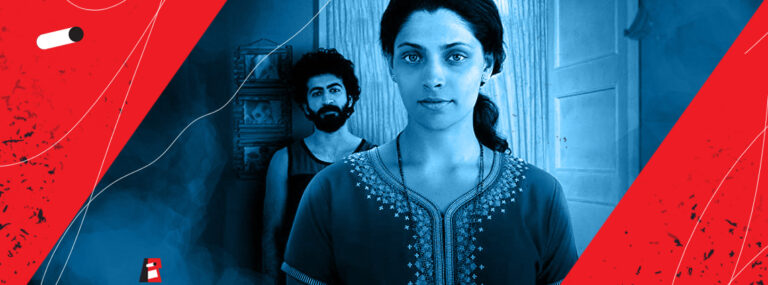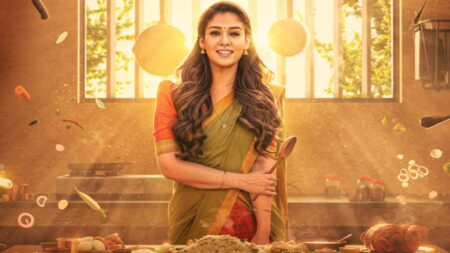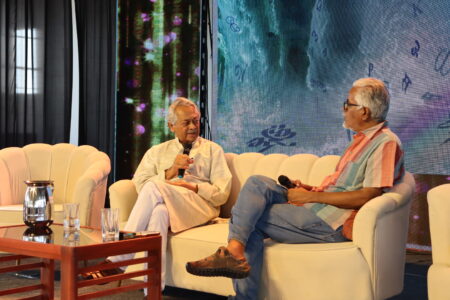Kashyap’s in-your-face take on Modi government’s November 2016 note-ban and its impact on Indian families can trigger a controversy for its content and character
Over-the-top (OTT) platforms are swamped with new movies and serials following the Covid-19 lockdown during which theatres remain shut and Indian families are glued to the television sets at home. Taking advantage of the situation, Bollywood director Anurag Kashyap has decided to premiere his brand new film — Choked – Paisa Bolta Hai (Money Talks) through Netflix. The film was released on June 5.
Choked deals with many issues, ranging from performance anxiety, black money, demonetisation, financial instability, the life of middle-class people living in Mumbai, flawed political systems, etc. We have seen Mumbai in Kashyap’s earlier films — Bombay Velvet, Ugly and in the Netflix series Sacred Games. Choked differs from Kashyap’s previous depictions of Mumbai and zooms the lens on to the life of a young couple – Sushant Pillai (Roshan Mathew) and Sarita Pillai (Saiyami Kher) who are struggling to live in the metro. Sarita is a cashier at a cooperative bank in Mumbai. Sushant has tried all the ways to earn but ended up in debt. They live with their son Sameer (Parthveer Shukla) and their life changes for the worse after the demonetisation drive initiated by Prime Minister Narendra Modi kicks in on November 8, 2016.
Note, the point
Sarita and Sushant are musicians, but Sarita has performance anxiety, which is still haunting her. The director hasn’t given away much details of the couple’s past, other than both having a surname Pillai, an upper-caste surname in Kerala, Tamil Nadu and elsewhere. Sushant speaks Tamil, which may confuse those who know Malayalam and Tamil as there is no reference to Tamil Nadu in the film. The couple doesn’t want to make their child witness their fights. Kashyap captures their petty bedroom fights in his own uniquely lighter mode.
Choked is Anurag Kashyap’s satire on the demonetisation drive. The director has taken all the liberty to criticise Modi and his supporters who hailed the November note-bandi. The women in Choked are more concerned about the demonetisation because they run the families and the unexpected turns could wreck their family budgets and other plans beyond repair.
While Sushant supports Modi’s policies, it’s Sarita who has to face the heat. She has to take care of her husband and son. During the demonetisation, bank employees had to work more than usual and Sarita, too, faces the heat. Kashyap, a vocal critic of the NDA government, dutifully and dexterously paints an honest portrait of the struggles of the people affected. But in an interview after the release of Choked, Kashyap said that his politics can’t be the politics of the characters in the movie as they are more concerned about their “daily survival”.
The rumours of chip-enabled currency notes pedalled then by pro-government fake news factories, also gets a mention in the movie. Digital India and the emergence of companies —Jio and Paytm — post-demonetization finds a place in this satire.
Kashyap offers an intriguing, yet alarming, account of how black money is being circulated through illegal ways in the country. We see stashed forfeited notes are carried in suitcases from housing localities to undisclosed locations in vehicles and are handled by pelf-pros. The touch of fiction added to these realities makes Choked a decent watch. We have read reports of influential businessmen getting informed about demonetisation before it was announced. Kashyap has picturised these instances which may irk Modi-government supporters.
In focus: women
Kashyap’s lady characters in Choked are all self-made. In fact, the film has more women characters than men and they have performed well in this 1-hour 54-minute movie. Amruta Subhash has an important role as the single mother Sharvari who is busy with the wedding of her daughter. She is shocked after she realizes that she can’t use old notes for paying bills. Her natural reactions to the various sequences in the film gives an identity to her character. Sarita as the breadwinner of her family is a well-scripted character by Kashyap and writer Nihit Bhave. Rajshri Deshpande appears in a cameo role as a nosey neighbour.
Choked has a kitchen sink, which plays an important role. The kitchen sink has an important role in most Indian households and traditionally, thanks to a patriarchal society, women are forced to associate with it more than the men. Much like in Irrfan Khan’s Lunchbox, Choked explores every nook and corner of the Indian kitchen. There is a scene in Choked in which a piece of broken ceiling falls inside the pressure cooker. It’s a smart way to depict the frustration of a lower-middle-class Indian homemaker, who is angry and sad after her efforts to cook dal (in a pressure cooker) went into vain.
Malayalam actor Roshan Mathew, who has proved his acting mettle in the acclaimed Malayalam film Moothon, makes his Bollywood debut with Choked. In Moothon, Mathew deftly played a mute youth. In Choked, Mathew is subtle as Sushant, whose care-free character is safe in the hands of Roshan.
An Anurag Kashyap movie usually has its uniqueness, we have witnessed it earlier. A fierce critic of right-wing forces, he has tried to deliver a film that is focused on the criticism towards demonetisation and black money, with a commendable thriller plot. But this portion gets non-effective in the end as the twist in the climax fails to impress. Being critical of the government, the director wasn’t able to do justice to the thriller element in the film, which works more as a visual critique a Tughlaqian policy than as a work of art that entertains to the hilt, like Kashyap’s own Gangs of Wasseypur or the excellent take on provincial chauvinism, Gulaal.




